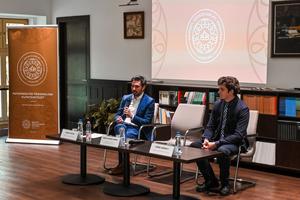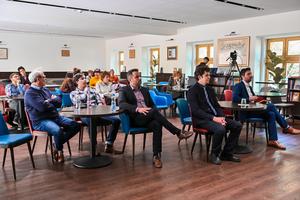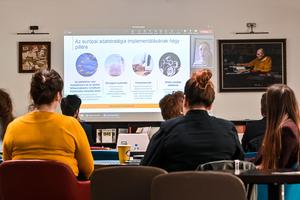On 26 April 2023, the Institute of the Information Society organised a workshop entitled The copyright dilemmas of data exploitation. The workshop was held in a hybrid format to present and discuss the challenges of copyright aspects of data exploitation.
Even the choice of the date of the workshop was not a coincidence, as Péter Lábody, researcher at the Institute of the Information Society at UPS and vice-president for Legal, International and Innovation Affairs of the Hungarian Intellectual Property Office , the organizer of the workshop, pointed out in his opening remarks - 26 April is World Intellectual Property Day. The motto of World Intellectual Property Day changes from year to year, and this year women are at the centre of this year's World Day theme, and the fact that the proportion of women in intellectual property protection is still low. Only around 16% of inventors who file international patent applications (a measure of human innovation) are women.
The workshop included four presentations, followed by some questions and a short constructive discussion. In the first presentation, Andrea Tóth from the European Commission's DG CNECT, Directorate for Data spoke about the data strategy of the European Union and its implementation from a copyright perspective. In the first part of the presentation, he outlined the four pillars for the implementation of the European Data Strategy: 1. a horizontal governance framework for access to and use of data, 2. supporting instruments (funding), 3. competences (digital skills, workforce), and 4. a common European data spaces; and the horizontal legislative environment, which includes the Data Act, the Data Governance Act, the Digital Market Act, and last but not least the Implementing Act on High Value Datasets. These laws are complemented by the GDPR as the main background legislation and sectoral legislation. In her presentation, Andrea Tóth presented and analysed in detail the main guidelines of the regulations and their practical applicability, taking into account the experience gained.
In the second lecture, Gergely Csősz, head of the Copyright Department of the Hungarian Intellectual Property Office, discussed the copyright issues of generative artificial intelligence. After clarifying the concept of generative AI, the speaker's first question was whether AI can be an author or an inventor at all. Although there is not yet a consensus on this, the experience of the DABUS case (can AI be an inventor?) and the Naruto-Slater case (can an animal be an author?) gives us an idea of the logic that can be used to decide these issues. We also gained insight into the challenges of copyright protection for AI-generated works through several concrete cases, including the controversies surrounding the works created by the AIVA composer software and the Midjourney image generator. Based on the examples given, there are various solutions to such difficult situations, but it seems realistic to consider that the copyright protection should be granted to the service provider who is the owner of the AI application. In the second half of his presentation, Gergely Csősz presented in detail the characteristics of the learning and teaching processes of artificial intelligences, which can be used to interpret the legal boundaries between the use of original works and the creation of derivative works.
Péter Mezei, professor at the Faculty of Law and Political Sciences of the University of Szeged, also discussed the copyright issues of generative artificial intelligences in his presentation, but from the perspective of jurisdiction and evidentiary procedures. He examined the extent to which free use cases can be applied to teach generative AI, and the extent to which works generated by AI can be excluded from copyright protection. He also drew attention to the technological and legal challenges of the different evidentiary procedures, analysing the experience of the decisions taken so far.
In her presentation, Anikó Grad-Gyenge, vice dean for science and innovation affairs at Budapest University of Technology and Economics, introduced the world of data repositories and open access publishing, presenting the history and importance of data repositories in the world of (university) libraries, in the credibility of scientific communication and in supporting research and development. She compared institutional and disciplinary repositories, and the differences and similarities between repositories and libraries. Open access removes the gatekeeper position of publishers and leaves them with almost only the editorial work to do, but it is also better for society because it ensures free access. Anikó Grad-Gyenge also analysed the copyright status and potential risks of open access data and databases and concluded that these databases play an indispensable and critical role in validating scientific research and publications. In the age of the internet, the availability of data is increasing and scientific activity is accelerating, so it is crucial that research results are properly validated. The speaker pointed out that there is a growing demand for access to scientific data and that there are already many good examples of open, free repositories, such as the European Open Science and ZENODO open, free platforms, which aim to support these processes.
During the exchange of views that followed the workshop, there was unanimous agreement on the need for further professional discussions on this topic, as many issues of fundamental importance have been opened up in the recent short period.


